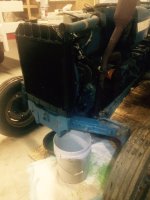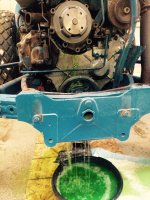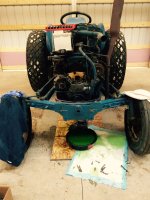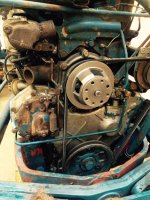tmac196
Silver Member
- Joined
- Aug 10, 2010
- Messages
- 163
- Location
- Temperance, MI
- Tractor
- 1951 Ford 8N, 1965 Ford 2000, Grasshopper 325D, JD 5065M
As stated above. Radiator and hoses are new (summer 2014). The coolant leak started slowly a few weeks ago, occurs at rest and has gotten more noticeable over time. Just a few drops a day. It appears to be coming from the water pump and (although I haven't yet removed the grille and radiator shell), specifically, from the shaft and bearing assembly which passes through the center of the water pump housing. I have noticed some growling noises coming from the front of the engine intermittently over the past few months and suspected the water pump bearing was going bad.
Two questions:
If I do find the source of the leak to be the shaft bearing assembly, what is the fastest and most efficient way to fix the problem? I don't have the tools to be "pressing the shaft out of the housing yadda, yadda...". Is it faster just to replace the entire pump itself?
Is the bearing shaft a more likely source of the leak or is the water pump gasket?
tmac
Two questions:
If I do find the source of the leak to be the shaft bearing assembly, what is the fastest and most efficient way to fix the problem? I don't have the tools to be "pressing the shaft out of the housing yadda, yadda...". Is it faster just to replace the entire pump itself?
Is the bearing shaft a more likely source of the leak or is the water pump gasket?
tmac



